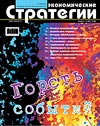Sustainability of the economic supersystem of Russia and Belarus under nuclear attack
DOI: 10.33917/mic-2.121.2025.5-13
Approaches to ensuring the sustainability of the economic supersystem of Russia and Belarus in the event of a nuclear attack are formulated. The technology under consideration is proposed as an integral part of the infrastructural segment of the economic supersystem for work in the context of implementing complex special projects (operations) with the adoption of justified management decisions that fit into the boundaries of trust between the command center and the operational zone, focused on the priorities of the strategy for conducting the SVO.
References:
1. Ageev A.I., Loginov E.L. The world community in conditions of supercritical bifurcation. Management of complex organizational and technical systems in conditions of supercritical situations: Proceedings of the international scientific and practical conference, Moscow, April 21-22, 2022. Moscow: Institute of Economic Strategies, 2022. pp. 9-12.
2. Ageev A.I. The role of sanctions, conflicts and special operations: reflections on the future. Part 1. Scientific Bulletin of the defense-industrial complex of Russia. 2023;4:66-74.
3. Ageev A.I., Grabchak E.P., Loginov E.L. Russia in a supercritical situation: managing the restoration of life support functions to overcome the consequences of a natural macrodisaster. Economic strategies. 2021;23(5 (179)):28-35.
4. Makarov V.L., Ageev A.I., Bakhtizin A.R., Grabchak E.P., Loginov E.L. Modeling the Consequences of a Nuclear Strike. Economic Strategies. 2022;24(4 (184)):6-16.
5. Grabchak E.P., Loginov E.L. New Possibilities of Electromagnetic Pulse Attacks on Critical Infrastructure Facilities. Transformation of Modern Warfare: Proceedings of the III All-Russian Scientific Conference, Omsk, February 16, 2024. Omsk: Military Academy of Logistics named after General of the Army A.V. Khrulev, 2024. pp. 108-112.
6. Ageev A.I., Loginov E.L. New Great War: Chronicles of a Well-Forgotten Future. Economic Strategies. 2014;16(6-7(122-123)):16-33.
7. Ageev A.I., Loginov E.L. Strategic Predetermination of Special Military Operations in the World Supersystem. Economic Strategies. 2023;25(4(190)):6-19.
8. Ageev A.I., Grabchak E.P., Loginov E.L. Use of Artificial Intelligence in the Implementation of Troop Command and Management of Civilian Facilities as a Single Hybrid Battlefield. Neurocomputers and Their Application: Abstracts of the XX All-Russian Scientific Conference, Moscow, March 22, 2022. Moscow: MGPPU, 2022. pp. 31-33.
9. Loginov E.L., Grabchak E.P., Epishkin I.I., Derkach A.K. Using quantum computing with the formation of a single computational space of ultra-large dimensions in the sphere of supplies of fuel and energy resources in the context of special period situations. Artificial societies. 2024;19(2).
10. Ageev A.I., Grabchak E.P., Loginov E.L. Using supercomputer technologies to manage the work of ultra-large organizational systems in the implementation of complex special projects (operations). Microeconomics. 2024;1:5-10.
11. Makarov V.L., Bakhtizin A.R., Loginov E.L. Application of Economic and Mathematical Methods and Models of Optimal Planning in the Digital Economy of the Future (Central Economics and Mathematics Institute of the USSR Academy of Sciences and Central Economics and Mathematics Institute of the Russian Academy of Sciences: Prognostic Interpretation and Development of the Scientific Heritage of Nobel Laureates L.V. Kantorovich and V.V. Leontiev). Moscow: Central Economics and Mathematics Institute of the Russian Academy of Sciences, 2022. 248 p.






